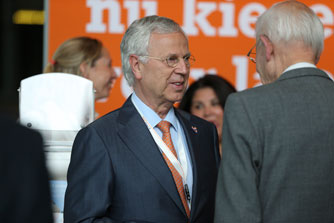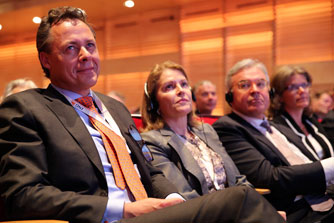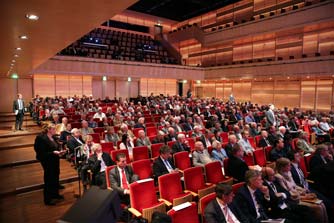“Dynamic implementation of ING’s strategy”
“Dynamic implementation of ING’s strategy”
ING’s Shareholders’ Meeting was held on 13 May. An impression.
The Muziekgebouw aan ’t IJ in Amsterdam was the venue for ING’s annual General Meeting on 13 May. ING shareholders, customers and other stakeholders had travelled to attend the meeting. 2012 was an important year for ING, a year that was dominated by the dynamic implementation of ING’s strategy. It was also a year in which the restructuring, and with it the future, of ING took further shape.
This was also a special meeting because one of the agenda items was the reappointment to the Executive Board of Jan Hommen until 1 October 2013 and the appointment to the Executive Board of Ralph Hamers. The Supervisory Board plans to appoint Ralph Hamers as the successor to Jan Hommen and CEO of ING Group from 1 October. Although it was the last time that Jan Hommen addressed the Meeting in his capacity as CEO, he made it known that he still had some important milestones he wanted to achieve before 1 October.
In his address, Jeroen van der Veer, chairman of the Supervisory Board, paused to consider Hommen’s enormous commitment and significance to the business in recent years and thanked him for staying on for a further five months to ensure a smooth transition for his successor and also for taking important steps in the further restructuring of the business. Jan Hommen also received compliments and a round of applause from the attendees.

Milestones
In his address, Hommen talked extensively about the strategy, annual figures and performance of ING Group. “2012 was an important year for us. The strategy was further revised, both at the bank and in the insurance business.
We are successful with our focus on customers and on sustainability. And ING is a financially stronger business. We have strong foundations to build a successful future. We’ve achieved significant milestones in implementing our Restructuring Plan, as agreed with the European Commission (EC) in 2009. Very recently, on 2 May, for example, we had the IPO of the US insurance business, which had involved a lot of hard work. This is an important step for ING U.S. towards an independent future.”
State aid
ING also made progress with the other disposals agreed with the EC. Additional milestones in 2012 include repayment of the State aid (ING has so far repaid EUR 10.2 billion), the agreement that ING and the Dutch State have reached with the EC on the amended Restructuring Plan, as a result of which ING has more time and greater flexibility to shape its future, reinforce the business financially and simplify and pare down the remuneration policy.
“We implemented ING’s strategic agenda in 2012 with great determination”, said Hommen, “in spite of a challenging external environment.” Hommen commented that there were few European banks that would actually repay the aid they had received. “And certainly not with a total exceeding EUR 3.5 billion in premiums and coupon payments.
Sustainability
The non-financial performance was also addressed. Hommen referred to the ING’s strong brand recognition. He also talked about the important role that ING plays in the Dutch economy. Steps had also been taken in the field of sustainability. For example, ING has virtually doubled the assets allocated to sustainable projects to EUR 5.7 billion.
The annual report has been improved, to include an overview of our scores and positions in external sustainability research, for example. Hommen also referred to the rising percentage of financed renewable energy projects in response, among other things, to customer demand and ING’s plans to invest more in sustainable energy projects.
Hommen also made reference to ING’s partnership with UNICEF. Thanks to this partnership, 92,469 children gained access to education in 2012. The aim is to have one million children in education by 2015.
Jan Hommen spoke about the external environment and its impact on the business. For example, he considered the challenges faced by the economy and equity markets in 2012 and the global, European and national regulatory measures to strengthen financial institutions and to stabilise the financial system.

Customer centricity
But above all, Hommen’s address focussed on customer centricity. “The customer has changing expectations and ING is happy to respond to them. Because the customer plays a pivotal role in our operations and ING is evolving with the customer.” He cited a number of examples.
“For example, we have introduced mortgage interest breaks for our customers in the Netherlands. Because in these tough times, house buyers need flexibility, especially when it comes to their mortgage. The use of mobile applications by customers has grown incredibly quickly. ING has responded to this and is making mobile banking available to its retail customers in all countries. Millions of customers now carry the bank around with them. The flip side is that if there is a technical fault, services are temporarily unavailable. However, we are doing all we can to prevent faults.
The insurance business too is placing great emphasis on good customer service. For example, in the Czech Republic and Slovakia, we have stepped up e-mail communication with customers since last year, leading to a swifter claims settlement process: 85% of claims are now settled within five days.” Hommen also paused to consider how customers value ING. “We measure how customers value us and use their input to make improvements. In 2012, customers once again valued our services more highly than in 2011.”
Appointments and reappointments
The annual General Meeting approved the reappointment of Jan Hommen and Patrick Flynn to the Executive Board. The meeting also approved the appointment to the Executive Board of Ralph Hamers.

Ralph Hamers, Isabel Martín Castellá, Hermann-Josef Lamberti
and Carin Gorter
A number of changes were also made to the composition of the Supervisory Board, with Ms Carin Gorter, Mr Hermann-Josef Lamberti and Ms Isabel Martín Castellá being appointed to the Supervisory Board.
The Supervisory Board proposed their appointments for the following reasons. Carin Gorter has experience in the banking sector and has an in-depth knowledge of risk, control, audit and compliance. She has an extensive network in the financial services industry. Hermann-Josef Lamberti boasts a successful global career in various sectors. He has in-depth knowledge of global businesses, financial services, as well as HR and IT. Isabel Martín Castellá brings with her 20 years of experience of economic and business affairs, finance and banking, both nationally (Spanish) and internationally.
Jeroen van der Veer and Tineke Bahlmann were also reappointed.
Annual report
The meeting also addressed ING’s decision to discontinue the Dutch-language annual report with effect from 2013 because its use and requests for it have declined significantly in recent years. With effect from next year, ING will therefore publish a digital annual review, containing the core components of the annual report.
Dividend policy
The dividend policy was also discussed. Given the uncertain financial climate, the increasing supervisory and regulatory requirements and the priority that ING gives to repaying the remaining outstanding Core Tier 1 securities, the Executive Board has not submitted a proposal for a dividend payment for 2012 to the AGM.

Turnout
Excluding the Stichting ING Shares, 51.36% of the total number of votes was cast at the meeting and via voting instructions.
The meeting adopted the Annual Accounts for 2012.
Visit www.ing.com/investor relations/shareholders’ meeting for all the meeting documents, including the agenda, presentations and the archived webcast.
The CVs of all the directors can be found at www.ing.com/about us/corporate governance.
